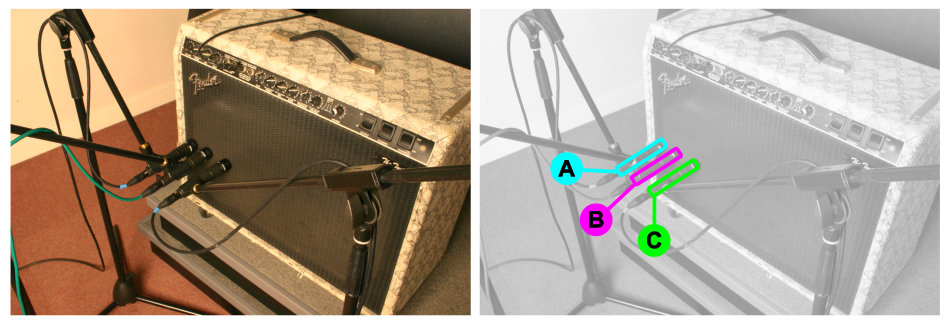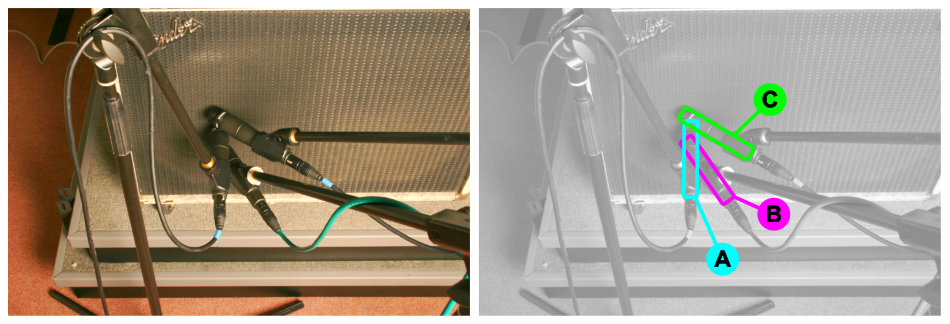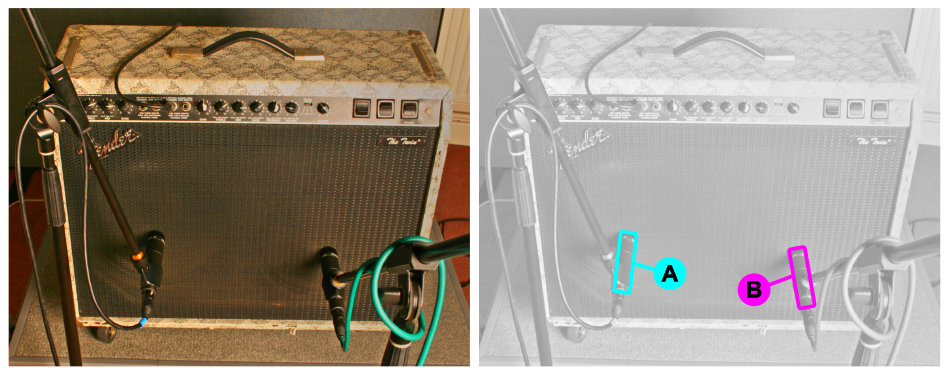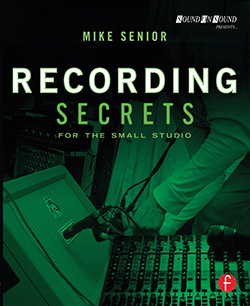Recording Secrets For The Small Studio - Additional Resources (1st Edition Archive)
Electric Guitar
(This page contains archived resources for the first edition of Recording Secrets For The Small Studio. You can access updated resource pages for the current edition here.)
The following audio examples were recorded with guitarist Tom Adams (playing a Fender Telecaster through a Fender Twin Reverb amplifier) in the Music Technology Department of Cambridge’s Hills Road Sixth Form College. The microphones used were Shure SM57 cardioid dynamic models, the most common professional choice for close-miking guitar amps. Many thanks to the college’s Director of Music, Jonathan Sanders, for the use of the recording facilities. The mics were preamplified via the mic preamps of a Tascam DM3200 digital mixer and recorded digitally without any signal processing.
Multimic Setup 1
This microphone setup used three Shure SM57 microphones, which all recorded a single performance simultaneously.
- Cone Position: These files demonstrate how the close-miked tone changes as you move the microphone from the centre to the edge of the speaker cone.

| Mic | Polar Pattern | Distance | Position/Angle | |
|---|---|---|---|---|
| A | WAV/MP3play_arrow | Cardioid | Directly on the grille cloth | Perpendicular to the grille cloth, pointing at the outer edge of the left-hand speaker cone |
| B | WAV/MP3play_arrow | Perpendicular to the grille cloth, pointing at a spot halfway between the outer edge and centre of the left-hand speaker cone | ||
| C | WAV/MP3play_arrow | Perpendicular to the grille cloth, pointing at the centre of the left-hand speaker cone |
Multimic Setup 2
This microphone setup used three Shure SM57 microphones, which all recorded a single performance simultaneously.
- Miking Angle: These files demonstrate how the close-miked tone changes as you angle it towards different parts of the speaker cone.

| Mic | Polar Pattern | Distance | Position/Angle | |
|---|---|---|---|---|
| A | WAV/MP3play_arrow | Cardioid | Directly on the grille cloth | Over the centre of the left-hand speaker cone, perpendicular to the grille cloth |
| B | WAV/MP3play_arrow | Over the centre of the left-hand speaker cone, angled 20 degrees outwards | ||
| C | WAV/MP3play_arrow | Over the centre of the left-hand speaker cone, angled 45 degrees outwards |
Multimic Setup 3
This microphone setup used three Shure SM57 microphones, which all recorded a single performance simultaneously.
- Miking Distance: In this comparison you can hear how the miking distance profoundly affects the recorded tone.

| Mic | Polar Pattern | Distance | Position/Angle | |
|---|---|---|---|---|
| A | WAV/MP3play_arrow | Cardioid | 1cm | A little to the left of the centre of the left-hand speaker cone, perpendicular to the grille cloth |
| B | WAV/MP3play_arrow | 30cm | ||
| C | WAV/MP3play_arrow | 90cm |
Multimic Setup 4
This microphone setup used two Shure SM57 microphones, which both recorded a single performance simultaneously.
- Different Speaker Cones: Although all the speakers in a guitar cabinet are usually meant to be identical, they never sound quite the same…

| Mic | Polar Pattern | Distance | Position/Angle | |
|---|---|---|---|---|
| A | WAV/MP3play_arrow | Cardioid | Directly on the grille cloth | Over the centre of the left-hand speaker cone, perpendicular to the grille cloth |
| B | WAV/MP3play_arrow | Over the centre of the right-hand speaker cone, perpendicular to the grille cloth |
Further Reading
- To read more about recording and mixing acoustic guitar, check out this Sound On Sound magazine article, to which the above audio examples directly relate.

